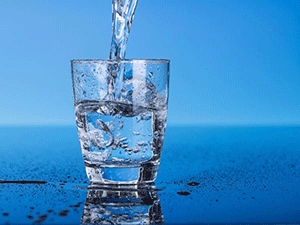Water conservation is important to both your drinking water and wastewater systems. Conservation is also important to help protect your pocket book. During the warm summer months and the growing season water use tends to increase as we try to help meet water demand of lawns, vegetable gardens, flowers and trees. However our water use inside the house can also tend to increase during the summer months—something we may not always realize. We may create more laundry, take more frequent showers, teenagers may be home during the days instead of at school, combined with other household practices that can increase our water usage.
There are an increasing number of ways to use water more efficiently within our society such as many appliances that are now designed to use smaller amounts of water, low-flow faucets and fixtures, and rain barrels to catch and reuse water outside the home. However, it is still a good idea to practice good conservation measures both within the and outside the home to protect the safety and reliability of your water supply. Developing good conservation habits now can help lower utility and maintenance costs and provide greater insurance for your water supply in years of drought.
Here are some other easy conservation measures to help reduce water use inside the home:
- Wash fewer full loads of laundry instead of multiple small loads and select the correct load size on your machine
- draw a pitcher of water to keep in the fridge so water isn’t wasted while you wait for the tap water to cool to the desired temperature
- shut the water off the flow of water while shampooing, brushing teeth, or shaving
- run the dishwasher only when you have a full load
- plug the sink if you washing
- compost leftover food can limit instead of running the garbage disposal
- adjust the water level in your toilet tank
- fix faucets that drip or have a small leak as soon as you notice the issue
- if you have a dehumidifier use the water collected by the machine to water house plants
- explore rebates or cost-share programs on the purchase or installation of water-efficient fixtures and appliances
To conserve water in the landscape outside your home
- Plant native or drought tolerant plants that require less water
- Purchase an inexpensive soil moisture probe to assess soil moisture and the need to water vegetables, flowers, trees and shrubs
- Ensure your in-ground irrigation system has a rain sensor installed and functioning to make sure your system does not run immediately after or during a rain shower.
- Sweep driveways, sidewalks, porches and decks instead of using water to rinse off dust and debris
- Wash your car using a bucket instead of running the water constantly
- Consider installing a soaker hose or drip irrigation system to help water plants more efficiently and reduce water lost to evaporation
These simple tips can save thousands of gallons of water and thousands of dollars in water bills and energy costs annually. You can find many more tips for easy ways to conserve water both inside and out at Water.unl.edu, Lancaster.unl.edu or the EPA WaterSense website.

